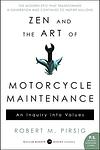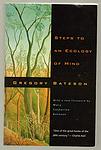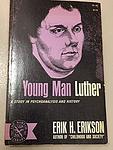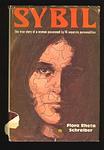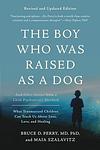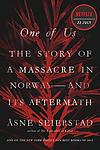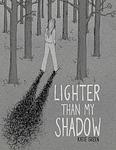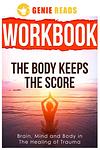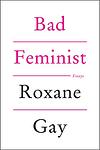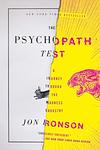The Greatest "Nonfiction, Psychological" Books Since 1950
Click to learn how this list is calculated.
This list represents a comprehensive and trusted collection of the greatest books. Developed through a specialized algorithm, it brings together 284 'best of' book lists to form a definitive guide to the world's most acclaimed books. For those interested in how these books are chosen, additional details can be found on the rankings page.
Genres
The Psychological genre of books typically explores the inner workings of the human mind and emotions, often delving into complex and sometimes disturbing psychological states. These books may focus on mental illness, trauma, relationships, or personal growth, and often challenge readers to confront their own beliefs and perceptions. Psychological books may be suspenseful, thought-provoking, and emotionally intense, offering readers a deep and often unsettling glimpse into the human psyche.
Countries
Date Range
Reading Statistics
Click the button below to see how many of these books you've read!
Download
If you're interested in downloading this list as a CSV file for use in a spreadsheet application, you can easily do so by clicking the button below. Please note that to ensure a manageable file size and faster download, the CSV will include details for only the first 500 books.
Download-
1. Zen and the Art of Motorcycle Maintenance by Robert M. Pirsig
The book is a philosophical novel that explores the protagonist's journey across the United States on a motorcycle with his son, during which he delves into questions about life, philosophy, and the nature of "Quality". The narrative is interspersed with flashbacks to the protagonist's life before the journey, including his time as a university professor and his struggle with mental illness. The book aims to reconcile the dichotomy between classical and romantic understandings of the world, ultimately arguing for a holistic approach that integrates both perspectives.
-
2. The Uses of Enchantment by Bruno Bettelheim
"The Uses of Enchantment" is a psychological analysis of fairy tales and their importance in childhood development. The book argues that these stories allow children to navigate their emotions and understand aspects of life they are yet to experience. By exploring various themes, such as separation anxiety, oedipal conflict, and sibling rivalry, through well-known fairy tales, the author demonstrates how these narratives contribute to a child's moral education and understanding of the human nature.
-
3. On Death and Dying by Elisabeth Kübler-Ross
This groundbreaking book explores the five stages of grief experienced by terminally ill patients. The author, a Swiss-American psychiatrist, introduces the concept of the five stages: denial, anger, bargaining, depression, and acceptance, which has since been universally recognized and applied in various fields. The book is based on the author's series of interviews with dying patients, providing an empathetic and insightful look into the emotional and psychological experiences of those facing death.
-
4. Thinking, Fast and Slow by Daniel Kahneman
The book delves into the two systems that drive the way we think—System 1, which is fast and intuitive, and System 2, which is slow and deliberate. The author, a Nobel laureate, explores how these systems shape our judgments and decision-making. He presents several groundbreaking experiments that have shaped our understanding of human thought, revealing where we can trust our intuitions and how we can tap into the benefits of slow thinking. The book also discusses how our cognitive biases often lead to errors in judgment and affect our decision-making processes.
-
5. Steps To An Ecology Of Mind by Gregory Bateson
The book in question is a seminal collection of essays and lectures that delve into the interconnectedness of biological, psychological, and sociological systems. The author, an anthropologist and cybernetic theorist, explores the concept of the mind as a fundamental element of the larger ecological system, challenging traditional boundaries between individual and environment. Through a series of interdisciplinary discussions, the work examines patterns of communication, the nature of learning and adaptation, and the importance of understanding the complex relationships that underpin the functioning of ecosystems, societies, and individuals. The author's innovative ideas encourage readers to reconceptualize the way they think about the world, emphasizing the necessity of a holistic approach to solving the myriad of problems facing humanity.
-
6. Young Man Luther by Erik H. Erikson
This book is a psychological analysis of a seminal figure in religious history, focusing on his early life and the internal struggles that led to his revolutionary actions. The author, a prominent psychologist, applies psychoanalytic theory to understand the subject's tumultuous journey from a conflicted young man to a leader who would challenge the very foundations of the Church. The work delves into the protagonist's experiences with authority, his quest for spiritual certainty, and the personal crises that fueled his theological breakthroughs, ultimately shaping the course of Western civilization.
-
7. Dependency by Tove Ditlevsen
"Dependency" is the harrowing autobiographical account of a woman's struggle with addiction and the complexities of her personal life in mid-20th-century Copenhagen. Through a raw and intimate narrative, the book explores the protagonist's turbulent relationships, her quest for love and artistic recognition, and her descent into drug dependency. The memoir provides a candid look at the cycles of abuse and recovery, painting a poignant portrait of a woman grappling with her inner demons and societal expectations in a time when such topics were often taboo.
-
8. My Father's House by Sylvia Fraser
The book is a harrowing memoir that delves into the author's traumatic childhood, marked by the dark secret of her father's sexual abuse. The narrative unfolds as the author, after years of repressed memories, begins to confront the truth about her past. This journey of self-discovery and healing challenges her understanding of family, memory, and identity. The memoir is a poignant exploration of the long-term effects of abuse and the complex process of recovery, as the author grapples with the betrayal by a person who should have been her protector, ultimately striving to reclaim her sense of self.
-
9. Sybil by Flora Rheta Schreiber
The book is a true story about a woman who, after suffering severe physical and emotional abuse as a child, developed sixteen different personalities as a coping mechanism. The narrative follows her journey with her psychiatrist as they attempt to fuse her multiple identities into one through therapy and treatment. The book offers an in-depth look at Dissociative Identity Disorder, its causes, manifestations, and treatment.
-
10. How To Change Your Mind: What The New Science Of Psychedelics Teaches Us About Consciousness, Dying, Addiction, Depression, And Transcendence by Michael Pollan
In "How To Change Your Mind," Michael Pollan explores the history, science, and potential therapeutic uses of psychedelic drugs such as LSD and psilocybin. He interviews researchers, therapists, and individuals who have undergone psychedelic experiences, and shares his own personal experiences with these substances. Pollan argues that psychedelics have the potential to unlock new understandings of consciousness, spirituality, and mental health, and could offer new treatments for addiction, depression, and end-of-life anxiety. He also explores the cultural and political factors that led to the demonization and criminalization of these substances, and advocates for a reevaluation of their legal status in order to facilitate further research and exploration.
-
11. The Boy Who Was Raised As A Dog : And Other Stories From A Child Psychiatrist's Notebook by Bruce D. Perry, Danny Campbell, Maia Szalavita
This book delves into the complex world of child psychiatry through a series of poignant case studies, each shedding light on the impact of trauma on the developing brain. The narrative explores the remarkable resilience of children and the ability of the right therapeutic interventions to heal psychological wounds. Through the lens of a seasoned child psychiatrist, readers gain insights into the science of human experience, the importance of nurturing relationships, and the transformative power of empathy and understanding in overcoming the most harrowing childhood experiences.
-
12. Phantoms In The Brain by Vilayanur S. Ramachandran, Sandra Blakeslee
"Phantoms in the Brain" explores the intriguing world of neurology through the lens of patients experiencing bizarre neurological disorders. The book delves into the mysteries of the human brain, examining cases of phantom limb pain, delusions, and other cognitive anomalies. Through these case studies, the authors illustrate how these unusual conditions can shed light on the normal workings of the brain, revealing the complex mechanisms behind human perception, behavior, and the sense of self. The narrative combines scientific rigor with engaging storytelling, making profound insights into neuroscience accessible to a general audience.
-
13. One Of Us: The Story Of Anders Breivik And The Massacre In Norway by Asne Seierstad
One of Us by Asne Seierstad is a detailed account of the 2011 terrorist attack in Oslo, Norway, carried out by Anders Breivik. The book explores Breivik's background, motives, and planning leading up to the attack, as well as the aftermath and impact on the survivors and families of the victims. Seierstad's thorough research and interviews with those affected provide a comprehensive and emotional portrayal of the tragedy, shedding light on the complexities of extremism and the devastating consequences of hate.
-
14. Lighter Than My Shadow by Katie Green
This graphic memoir is a powerful and deeply personal exploration of a young woman's struggle with eating disorders and trauma. Through evocative hand-drawn illustrations, it chronicles her journey from early signs of anorexia in childhood, through years of battle with her inner demons, to eventual recovery. The narrative delves into the complexities of mental health, the impact of abuse, and the resilience of the human spirit. The author's raw honesty and the visual storytelling create an engaging and poignant tale that brings to light the silent suffering of those dealing with similar issues, offering hope and understanding to others on their path to healing.
-
15. Lo Que No Tiene Nombre by Piedad Bonnett
The book is a poignant and deeply personal memoir that delves into the heart-wrenching experience of a mother grappling with her son's severe mental illness and eventual suicide. Through a raw and honest narrative, the author explores the complexities of her son's struggle with depression, the impact of his condition on their family, and the profound grief that follows his tragic death. The memoir serves as a meditation on loss, love, and the often misunderstood nature of mental health, offering a touching tribute to her son while also shedding light on the broader issues surrounding mental illness and the challenges faced by those who suffer from it and their loved ones.
-
16. The Body Keeps The Score by Bessel van der Kolk
This book delves into the complex effects of trauma on the mind and body, exploring how traumatic experiences can alter an individual's biology and brain chemistry, leading to lasting psychological and physical consequences. The author, a renowned expert in trauma, integrates clinical case studies with scientific research to demonstrate how trauma reshapes the brain's wiring, particularly areas dedicated to pleasure, engagement, control, and trust. The book also offers hope by presenting advances in treatment, including innovative therapies that help patients reclaim their lives, suggesting that recovery is possible through understanding the science of trauma, mindfulness, and reconnection with one's body.
-
17. Hunger by Roxane Gay
"Hunger" is a powerful memoir that delves into the complex relationship between the author's body and her experiences of trauma, shame, and self-worth. Roxane Gay fearlessly explores the physical and emotional implications of living in a world that often judges and marginalizes individuals based on their appearance. Through her raw and honest storytelling, she invites readers to confront their own biases and challenges societal norms, ultimately advocating for self-acceptance and compassion.
-
18. The Psychopath Test by Jon Ronson
This book explores the complex world of psychopathy, delving into how the condition is diagnosed and what it means for both individuals and society. Through a series of intriguing interviews and encounters with people labeled as psychopaths, as well as with those involved in identifying them, the author investigates the validity and impact of the psychopath diagnosis. The narrative raises critical questions about the reliability of the psychopath test, the nature of mental health diagnosis, and the ethical implications of labeling someone as a psychopath, all while maintaining a balance between humor, skepticism, and empathy.
-
19. Explaining Humans by Camilla Pang
"Explaining Humans" is an insightful and thought-provoking book that explores the complexities of human behavior and neurodiversity. Written by Camilla Pang, a neurodivergent scientist, the book offers a unique perspective on understanding the world through the lens of autism and ADHD. With a blend of personal anecdotes, scientific research, and philosophical reflections, Pang delves into topics such as emotions, social interactions, and the pursuit of knowledge, providing readers with a deeper understanding of what it means to be human.
Reading Statistics
Click the button below to see how many of these books you've read!
Download
If you're interested in downloading this list as a CSV file for use in a spreadsheet application, you can easily do so by clicking the button below. Please note that to ensure a manageable file size and faster download, the CSV will include details for only the first 500 books.
Download